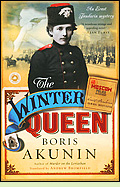|
The Winter Queenby Boris AkuninReviewed by Susan Gillmor Fandorin is a wet-behind-the-ears, lowest of the low “clerk and civil servant fourteenth class” in Moscow’s Criminal Investigative Division, entrenched in Tsarist Russia’s strict hierarchical system of rank. His job is simply to write up reports, but when he receives an account of the latest in “the fashionable epidemic of pointless suicides,” he remarks to his superior that “there’s some kind of mystery here, I swear there is!” His superior, the “venerable superin-tendent” Xavier Grushin, recognizes in the young clerk an innate nose for detecting and allows Fandorin free rein to follow his instincts. The mystery quickly mushrooms to include a case of clear-cut murder, suspected international intrigue and “denizens of the very darkest depths of society.” Fandorin will chase the clues from Moscow to London, with stops at Paris and Vienna on his way back to Mother Russia, unraveling the mystery slowly, continually surprised at the twists and turns the case takes, and “climbing the ladder very fast” from lowly clerk to undercover detective and beyond. The prose of Andrew Bromfield's English translation is simple yet elegant. Numerous details support the historical atmosphere: A St. Petersburg police division implements both a telegraph and an experimental telephone, known as “Bell’s apparatus,” for its police work. Fandorin is saved from a fatal stabbing by the whalebones in his Lord Byron corset, an American invention promising “a truly manly figure - an inch-thin waist and yard-wide shoulders!” The Winter Queen comprises elements of mystery, detective story, and traces of Russian fairytale as Fandorin repeatedly defies death in near-supernatural ways. Underlying its light, ironical spirit is a characteristic Russian darkness reminiscent of Dostoevsky or Tolstoy. (English translation by Andrew Bromfield, 2003; 249 pages) More about The Winter Queen at Powell's Books or Amazon.com
Sister Pelagia and the White Bulldog by Boris Akunin (2006), features a nineteenth century Russian nun as the sleuth; #1 in the Sister Pelagia mystery series. More info The Gentle Axe by R.N. Morris (2007), features the fictional St. Petersburg police detective from Dostoevsky's Crime and Punishment. More info White Blood by James Fleming (2006), is a thriller about a naturalist snowbound in pre-revolutionary Russia who begins to suspect one of the soldiers trapped along iwth him may be a Bolshevik with murder on his mind. More info
Alexander II: The Last Great Tsar by Edvard Radzinsky (2005), about the tsar who ruled from 1855-1881, during the period when the Erast Fandorin mysteries are set. More info Slavophile Empire: Imperial Russia's Illiberal Path by Laura Engelstein (2009). More info Moscow: An Illustrated History by Kathleen Berton Murrell (2002).
Crime and Punishment
Russian History, 1855-1892 at Wikipedia Back to Novels of Nineteenth Century Europe
|
